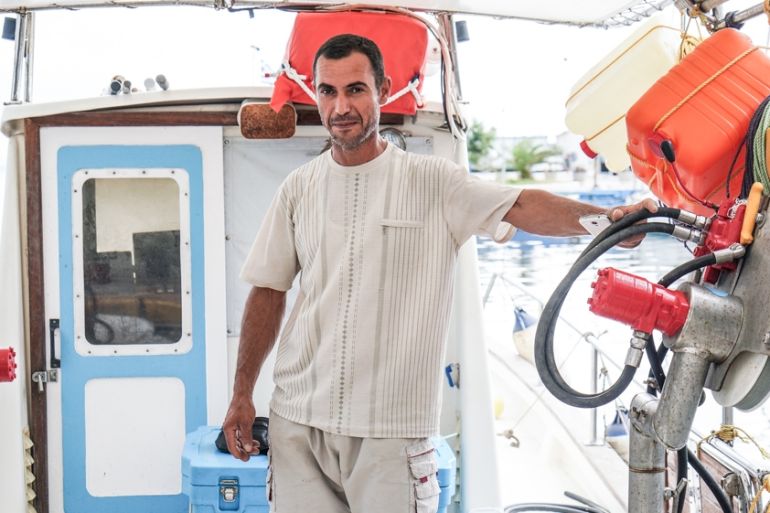Egyptian fisherman: I saved 23 Greeks, four dogs from wildfires
The sea was the only escape for many running for their lives as fires raged. Egyptian fisherman rushed to help.

Nea Makri, Greece – Mahmoud al-Sayed Mousa was relaxing on his couch when his phone rang at 6:30pm on July 23.
Wildfires had gripped the coastal village of Mati, and people were desperately wading into the sea to escape.
Keep reading
list of 4 itemsThe Alabama town living and dying in the shadow of chemical plants
How India is racing against time to save the endangered red panda
Canada wildfires spur evacuation orders, warnings: What you need to know
“Come quick,” said Kostas, his boss.
The 46-year-old Egyptian fisherman rushed out of his home and climbed onto his bicycle.
He could see plumes of smoke shifting above the far-off shores, and pedalled as fast as he could.
Within moments, he arrived at the port in Nea Makri, where they dock their fishing vessel. They set sail.
“We heard that 150 people were trapped between the fire and the sea,” he tells Al Jazeera.
Forceful waves swayed the boat. The wind carried the thick black smog out to sea, but they carried on, coughing more and more the closer they got to Mati’s shores.
Red rescue helicopters hovered above.
If we entered the smoke, we could die. If we didn't enter, the people wouldn't be saved.
He filmed much of it on his mobile phone, posting live video clips on his Facebook feed. One showed the white fishing boat speeding in the direction of the smoke.
“We are going to save the people [fleeing] the fire,” Mousa says in the clip.
Debris was scattered in the water below. Kostas and Mousa reached a dense cloud that blocked their view of the flame-engulfed village in the distance.
“You couldn’t see in front of you, and you couldn’t breathe,” he recalls.
“It was the hardest moment,” he says, resting his work-scarred hands on his lap. Tears well in his tired eyes. “If we entered the smoke, we could die. If we didn’t enter, the people wouldn’t be saved.”
News of scattered wildfires was trickling in. Some spread in Kineta, and others popped up on the outskirts of Rafina, the port town adjacent to Mati, among other areas.
By early evening, Mati, a popular vacation destination for Greeks and tourists, was an inferno. Flames lashed the village, coiling around homes and vehicles.
With the fire encroaching, frantic people poured out of their homes to escape.
Many were unable to find a route out of the village and were forced to abandon their vehicles in the streets and head for the sea. Little by little, reports of deaths emerged.
‘It was nothing’
Mousa is one of thousands of Egyptian fishermen in Greece.
He was 16 years old when he left his hometown Ezbet El Borg, a northern coastal city with a large fishing industry.
In his 30 years here, he says he has never witnessed anything as frightening as the wildfires.
Back on the boat, the smell of burned wood overwhelmed Mousa. Through the hazy fog, he heard the muffled cries of women and children.
He covered his mouth and nose with a cloth to try and limit the fumes he was inhaling.
They steered the boat into the dark, unsure of what to expect.
“We either bring them back with us or we die with them, God willing,” Mousa told Kostas.
In the past, Egyptian fishermen were victims of racist violence by the criminal party Golden Dawn. But humanity doesn't differentiate between nationalities, and there is no difference between Greeks and Egyptians.
As the sound of people pleading for help grew closer, Mousa knotted a rope and flung it into the sea. Someone grabbed on. He pulled a man in and lifted him up onto the vessel.
Daylight was fading as the sun dipped behind the hills. They scoured the waters around them, locating and pulling up each person they found.
“We scooped them up like when we’re fishing,” Mousa remembers. “People were crying and shaking while they hugged us.”
By the time it was over, they had saved 23 Greeks and four dogs, he estimates.
Mousa and Kostas brought the survivors back to dry land in Nea Marki.
“It was nothing,” Mousa told the grateful survivors.
‘Our duty to help’
The efforts of rescue teams, the coastguard and others resulted in upwards of 700 people being saved.
At least 91 people died; they either burned alive, drowned or succumbed to smoke inhalation.
Twenty-six bodies, among them children, were found the next day huddled together near a steep cliff overlooking the jagged coastline.
“They had tried to find an escape route, but unfortunately these people and their kids didn’t make it in time,” Nikos Economopoulos, the head of Greece’s Red Cross, told the local Skai TV last Tuesday. “Instinctively, seeing the end nearing, they embraced.”
![Rescue workers are still searching for at least 25 missing people [Nick Paleologos/SOOC/Al Jazeera]](/wp-content/uploads/2018/07/44796e01a4e34bd295c0ea81ded10071_18.jpeg)
Greek authorities say 25 people are still missing.
More than 1,000 homes were destroyed.
The wildfires scorched 6,879 hectares of forest and residential land.
Several other Egyptian fishermen answered the coastguard’s call for assistance, and Pakistani and Afghan migrant groups sent volunteers to Mati to help in the cleanup effort.
Naim Elghandour, the Egyptian-born president of the Muslim Association of Greece, describes the efforts of Muslim refugees and migrants during the fires and after as “heroic”.
“In the past, Egyptian fishermen were victims of racist violence by the criminal party Golden Dawn,” he tells Al Jazeera, referring to the neo-fascist party with 16 seats in the Hellenic Parliament.
“But humanity doesn’t differentiate between nationalities, and there is no difference between Greeks and Egyptians.”
Although rattled by the tragedy, Mousa says: “I’m happy I was part of the reason those people were saved … It was our duty to help.”